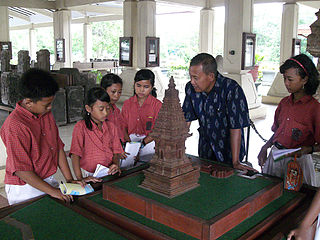A convention is a set of agreed, stipulated, or generally accepted standards, social norms, or other criteria, often taking the form of a custom.

Mores are social norms that are widely observed within a particular society or culture. Mores determine what is considered morally acceptable or unacceptable within any given culture. A folkway is what is created through interaction and that process is what organizes interactions through routine, repetition, habit and consistency.

The Mouride brotherhood is a large tariqa most prominent in Senegal and The Gambia with headquarters in the city of Touba, which is a holy city for the order. Adherents are called Mourides, from the Arabic word murīd, a term used generally in Sufism to designate a disciple of a spiritual guide.The beliefs and practices of the Mourides constitute Mouridism. Mouride disciples call themselves taalibé in Wolof and must undergo a ritual of allegiance called njebbel, as it is considered highly important to have a sheikh "spiritual guide" in order to become a Mouride. The Mouride brotherhood was founded in 1883 in Senegal by Amadou Bamba. The Mouride make up around 40 percent of the total population, and their influence over everyday life can be seen throughout Senegal.
A marabout is a Muslim religious leader and teacher who historically had the function of a chaplain serving as a part of an Islamic army, notably in North Africa and the Sahara, in West Africa, and (historically) in the Maghreb. The marabout is often a scholar of the Qur'an, or religious teacher. Others may be wandering holy men who survive on alms, Sufi Murshids ("Guides"), or leaders of religious communities.

The culture of Liberia reflects this nation's diverse ethnicities and long history. Liberia is located in West Africa on the Atlantic Coast.

Etiquette in Japan forms common societal expectations of social behavior practiced throughout the nation of Japan. The etiquette of Japan has changed greatly over the millennia as different civilizations influenced its culture. Modern Japanese etiquette has a strong influence from that of China and the Western world, but retains many of its unique traditional elements.

Islam is the predominant religion in Senegal. 97 percent of the country's population is estimated to be Muslim. Islam has had a presence in Senegal since the 11th century. Sufi brotherhoods expanded with French colonization, as people turned to religious authority rather than the colonial administration. The main Sufi orders are the Tijaniyyah, the Muridiyyah or Mourides, and to a lesser extent, the pan-Islamic Qadiriyyah and the smaller Layene order. Approximately 1% are Shiites.

The beliefs and practices of African people are highly diverse, including various ethnic religions. Generally, these traditions are oral rather than scriptural and are passed down from one generation to another through folk tales, songs, and festivals, and include beliefs in spirits and higher and lower gods, sometimes including a supreme being, as well as the veneration of the dead, and use of magic and traditional African medicine. Most religions can be described as animistic with various polytheistic and pantheistic aspects. The role of humanity is generally seen as one of harmonizing nature with the supernatural.

Rudeness is a display of actual or perceived disrespect by not complying with the social norms or etiquette expected within a relationship, social group, or culture. Social norms are established as the essential guidelines of normally accepted behavior within a given context, and individuals often establish personal boundaries to meet their own needs and desires within smaller settings, such as friendships. To be unwilling to align one's behavior with these norms known to the general population of what is socially acceptable is to be rude. These norms may resemble a sort of "unspoken law", with social repercussions or rewards for violators or advocates, respectively.

Etiquette in Asia varies from country to country even though certain actions may seem to be common. No article on the rules of etiquette, nor any list of faux pas, can ever be complete. As the perception of behaviors and actions vary, intercultural competence is essential. A lack of knowledge about the customs and expectations of Asian people can make even those with good intentions seem rude, foolish, and disrespectful.
Etiquette in Europe is not uniform. Even within the regions of Europe, etiquette may not be uniform: within a single country there may be differences in customs, especially where there are different linguistic groups, as in Switzerland where there are French, German and Italian speakers.
Expectations regarding good manners differ from person to person and vary according to each situation. As the perception of behaviors and actions vary, intercultural competence is essential. However, a lack of knowledge about the customs and expectations of people in Australia and New Zealand can make even the best intentioned person seem ignorant, inconsiderate or even rude. Given the historic roots, it's very similar to British culture, specifically the United Kingdom, terms such as ‘fanny’ as well as the emphasis on politeness in queuing are observed in both cultures.

A talibé is a boy, usually from Senegal, the Gambia, Guinea, Guinea-Bissau, Chad, Mali or Mauritania, who studies the Quran at a daara. This education is guided by a teacher known as a marabout. In most cases talibés leave their parents to stay in the daara.

Religion in Angola is diverse, with Christianity being the most widely professed faith. Roman Catholics constitute 41% of the population. Other Christian denominations include Baptists, Methodists, Congregationalists, Lutherans, Reformed Churches and Seventh-day Adventists and Jehovah's Witnesses - all these denominations making up about 43% of the population.

Religion in Ivory Coast is diverse, with no particular religion representing the majority of the population. According to the 2021 census, Islam is professed by 42.5% of the total population, while adherents of Christianity represented 39.8% of the population. In addition, 12.6% of Ivorians reported to be non-religious and 2.2% claimed to follow Animism.

The Gambia is a Muslim majority country, with Muslims constituting 96.4% of the population, some 3.5% are Christian, and 0.1% practice other religions.

There are various ethnic groups in Senegal, The Wolof according to CIA statistics are the majority ethnic group in Senegal. Many subgroups of those can be further distinguished, based on religion, location and language. According to one 2005 estimate, there are at least twenty distinguishable groups of largely varying size.

Traditions of Indonesia are traditions, beliefs, values, and customs that belong within the culture of Indonesian people. Indonesia is a vast country of sprawling archipelago with a diverse demographic range of over 1,300 ethnic groups, and speaking more than 700 living languages.

Various codes of etiquette in Indonesia govern the expectations of social behavior in the country and are considered very important. Etiquette demonstrates respect and is a key factor in social interactions. Like many social cultures, etiquette varies greatly depending on one's status relative to the person in question. Some conventions may be region-specific, and thus may not exist in all regions of Indonesia. The following are generally accepted contemporary customs in Indonesia.
Religion and beliefs occupy an important place in the daily life of the nation of Senegal. The majority of citizens follow Islam. In 2013, 6% of the population followed indigenous beliefs, while 2% followed Christianity.
















